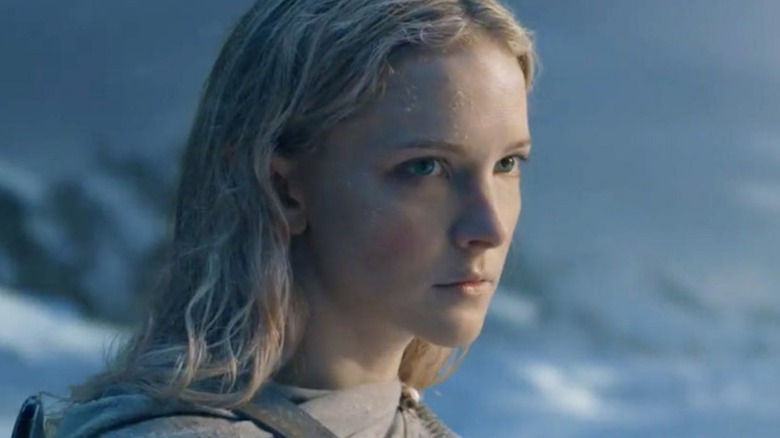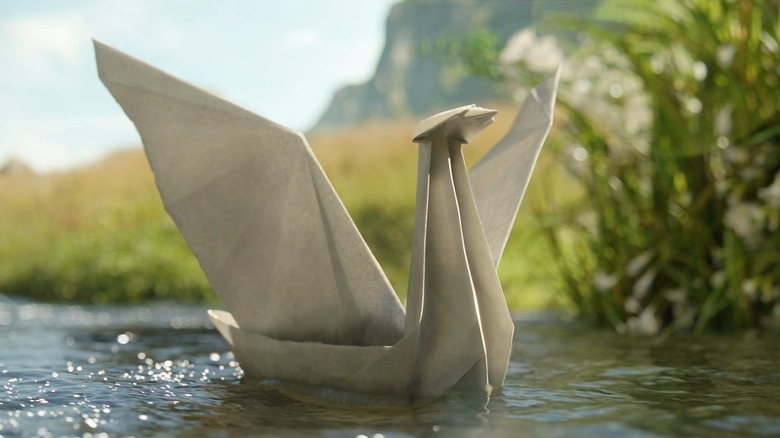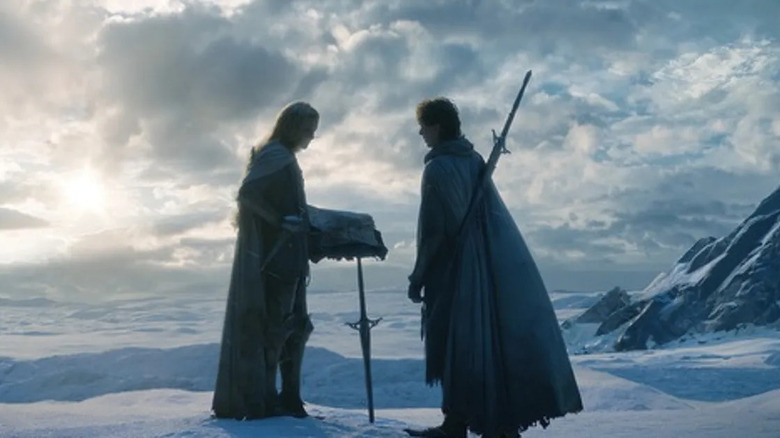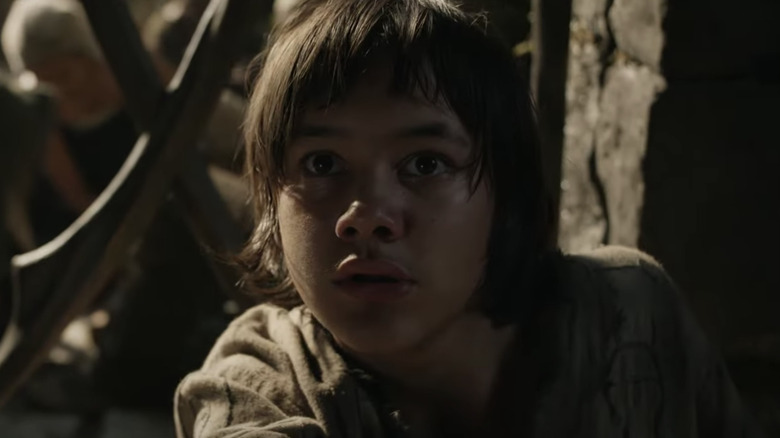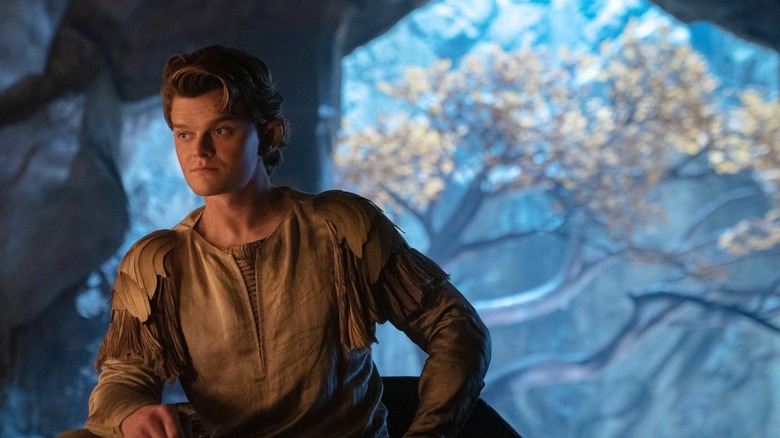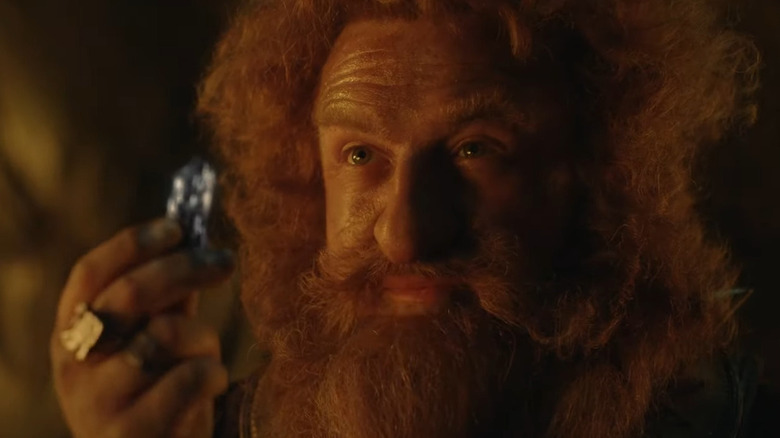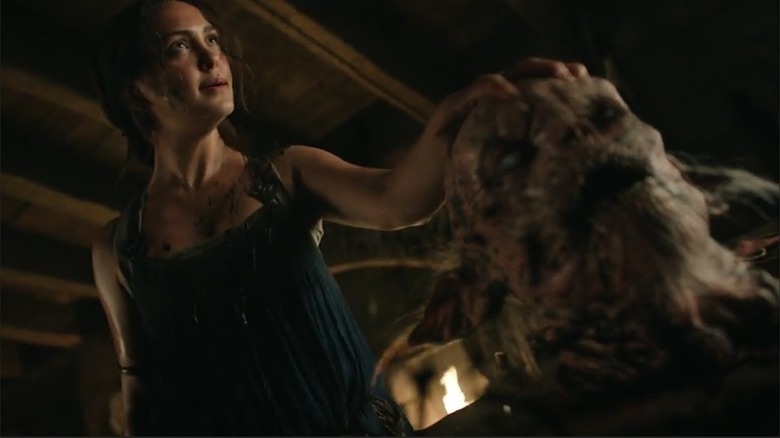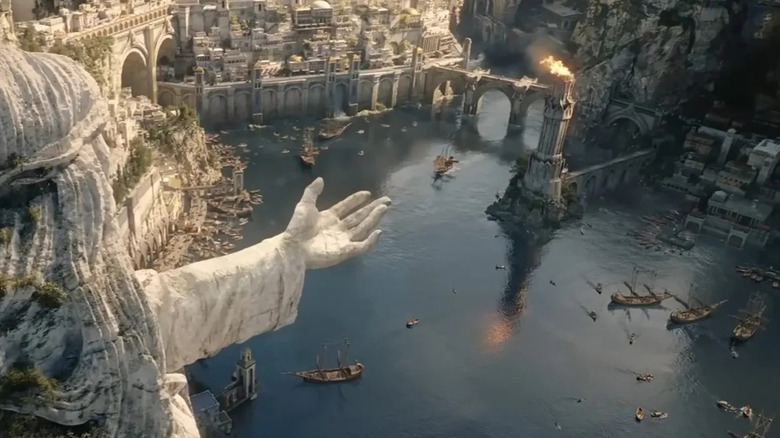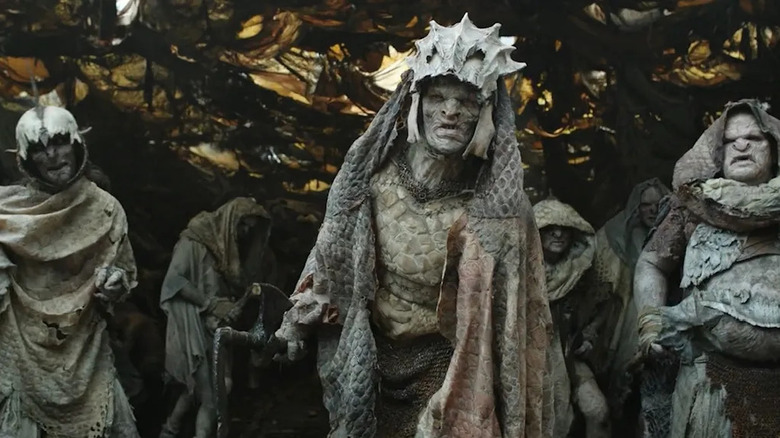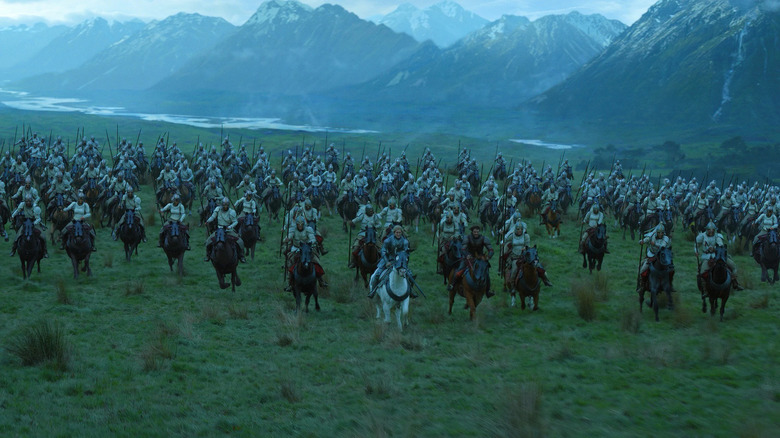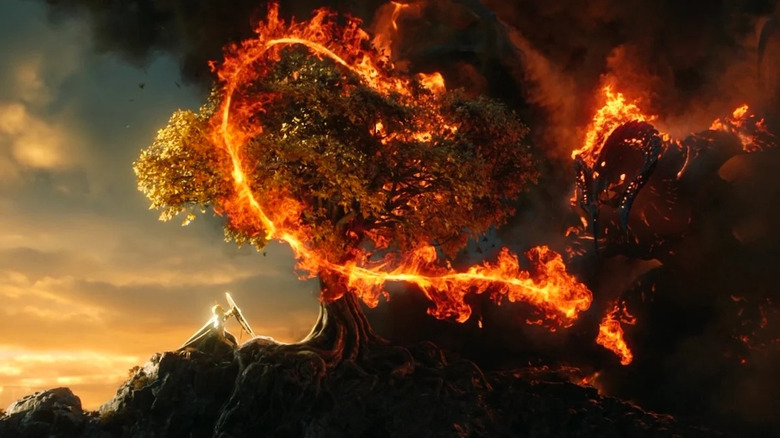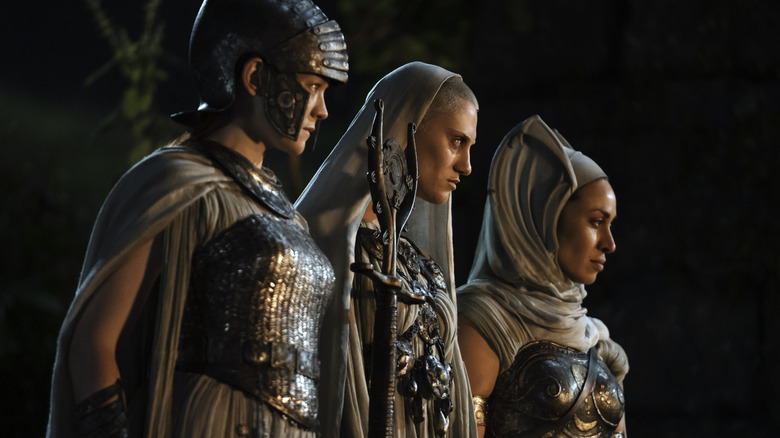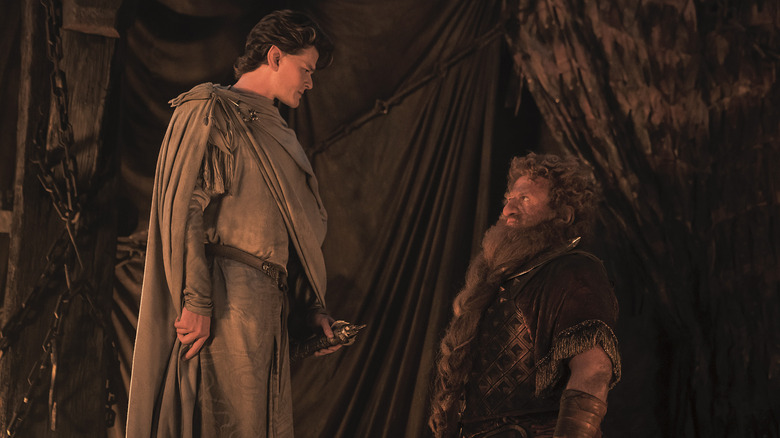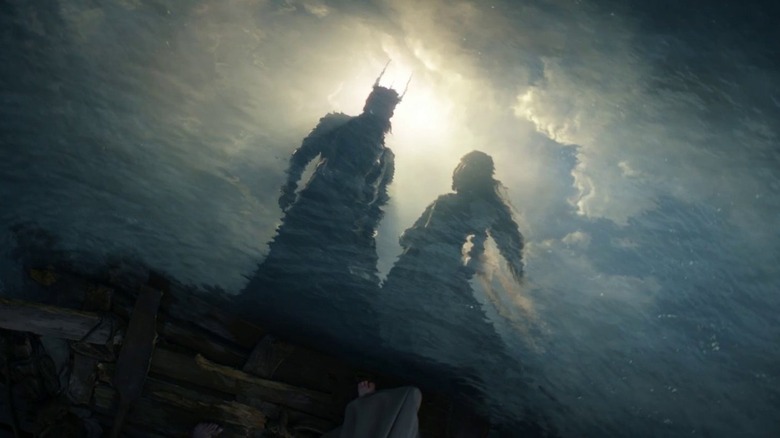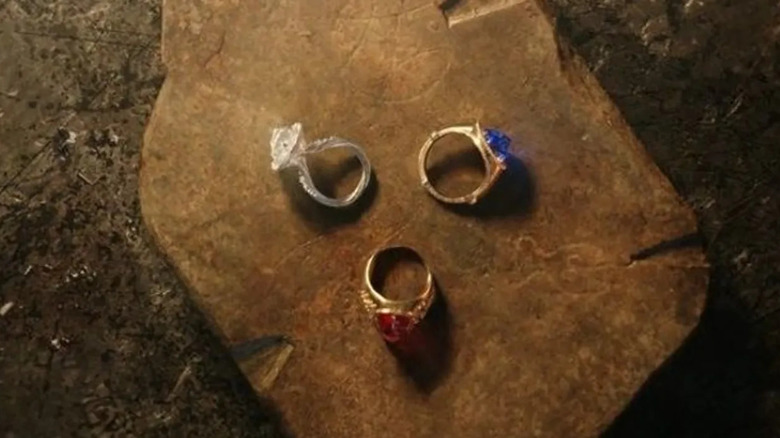The 7 Best And 7 Worst Moments In The Lord Of The Rings: The Rings Of Power
Evidently, you can't have a modern streaming service without an epic fantasy television show. HBO Max has "Game of Thrones" and its spinoff, "House of the Dragon," Netflix has "The Witcher," and now Amazon has "The Rings of Power." Amazon spent an astounding $465 million on season 1 of "The Rings of Power" alone. Fortunately, you can tell that a large portion of that money went where it counts the most.
Though "The Rings of Power" is nowhere near the caliber of Peter Jackson's "The Lord of the Rings" trilogy, there are moments that stand shoulder-to-shoulder with the films. Alas, there are just as many that feel like bad fan-fiction. "The Rings of Power" may be pretty, but the writing is frequently just plain bad. That's a true pity, as much of the rest of the show — the cast, the score, the CGI — is quite good, with gorgeous cinematography and an epic scope that befits the world of Middle-earth. Here are the seven best and worst moments from "The Rings of Power" season 1.
Worst: The prologue
The comparisons between "The Rings of Power" and Peter Jackson's "The Lord of the Rings" trilogy are both unfortunate and inevitable, but Amazon's television show does itself no favors by deliberately mimicking familiar story beats from author J.R.R. Tolkien's epic. The handsomely scruffy outsider who's actually a long-lost human king, but his ancestor did bad things so he feels personally tainted. Little people inexorably swept up in the tide of a big adventure. Dwarves and elves who hate each other for no good reason.
But the most painful example of this "same but worse" philosophy is found in the opening moments of the series. Just like Jackson's trilogy, "The Rings of Power" begins with a prologue narrated by Galadriel (Morfydd Clark). Prologues are generally unnecessary, and must earn their place by telling the audience something they would not otherwise know. In the films, we get a succinct 5-minute prologue that gives us the gist on the ring and its history. The show goes in a different direction, spending 4 long and boring minutes with Galadriel and her paper boat. Only 2 minutes out of the 8-minute prologue are engaging and informative. The rest is a bland and boring introduction to the series.
Best: Galadriel hunts Sauron
The first episode of "The Rings of Power" is almost a complete wash. It's slow and frequently boring, bookended by that dreadful prologue and the long, poorly-written dialogue between Galadriel and Elrond (Robert Aramayo). Fortunately, the premiere includes one stand-out scene that makes the slog worthwhile.
The one thing the prologue makes abundantly clear is that Galadriel has good reasons for wanting Sauron dead. The first real scene of the show involves an exciting sequence in which Galadriel and a band of elven warriors track the Dark Lord across a bitter, frozen wasteland. The sequence is full of arresting visuals and a great atmosphere. We're given to understand this hunt has been going on for a long time, and that everyone but Galadriel has had enough. It's a far more effective and interesting introduction to the show than the prologue.
As the small band braves an abandoned fortress, the episode adopts a more horrific aesthetic, one that's punctuated by an ambush by a cave troll. The ensuing fight is brutal but short-lived, as Galadriel quickly and stylishly solos the monster. It's immediately clear that this is not the Galadriel you knew before. Here, she's a beast.
Worst: Theo destroys the floor
There's a potential companion piece to this one entitled "Theo's 7 Worst Moments." To put it bluntly, Theo (Tyroe Muhafidin) is a doofus and an idiot. His primary contribution to the story seems to be introducing complications and making things insufferably worse for everyone. It's doubtful that any viewer would've been disappointed if Theo had taken up Waldreg's (Geoff Morrell) offer to join with the orcs, although they probably wouldn't have put up with him for very long.
All of which is to say, Theo has an abundance of bad moments to choose from. His worst, though, is probably this one. Theo is alone at home, staring angrily into the hearth. A typical Saturday night in the Southlands, probably. He hears some scratching under the floorboards and just snaps. His default setting is "angry and confused," but he immediately jumps up to "foaming mad." We still don't know why.
Grabbing a poker from the hearth, Theo goes all Jack Torrance on his mom's floor while ranting about mice. It's worth pointing out that their home is barely a step up from a hovel. Stuff is already falling apart — one of the cabinet doors doesn't have hinges and sort of just sits in place. There's no reason to ruin a perfectly good floor, even if there are mice scuttling around underneath. Unfortunately, an orc arrives before Bronwyn (Nazanin Boniadi) can assess the damage and ask Theo the question we've all been wondering: What is wrong with you?
Best: Elrond and Durin reconcile
Elrond eagerly sets out for Khazad-dûm to enlist his old dwarven friend Prince Durin IV's (Owain Arthur) help in building a special sort of tower. He doesn't receive the sort of welcome he envisioned, and is left sitting on the doorstep until he submits a challenge that Durin can't ignore. It's very much a "Han Solo arriving at Bespin" sort of moment. Like Lando, Durin is even a bit duplicitous.
Durin is rightly salty that Elrond hasn't visited in 20 years. He missed Durin's wedding and the birth of his children. Twenty years is nothing to an elf, of course, but Durin lived a lifetime in that time. The two ultimately reconcile over a tree; Durin planted a seed that Elrond gave him and nursed it to life in the cold dark of the mountain, even when everyone else mocked him for trying. The tree is a beautiful metaphor for their relationship. For 20 years, Durin cared for that tree as though it was his friend, and he found his way back to Elrond because of it.
Worst: Durin gives Elrond a piece of mithril
Shortly after Elrond and Durin reconcile, we are introduced to a mysterious intrigue via the dwarf and his father, king Durin III (Peter Mullan). They talk vaguely about something in a small chest that we can't see, but they seem to be conspiring against the elves, which is surprising given that Durin and Elrond have just patched things up. Sometime later, we finally get a glimpse of the big mystery: The dwarves discovered a powerful new ore called mithril.
Durin goes out of his way to hide this discovery from Elrond, avoiding him and straight out lying about it. He even entangles his wife in the deception. For the dwarves, mithril offers the potential for great wealth and power. Elrond finally gets Durin to admit what's going on by promising to keep his secret, and Durin comes clean. Then, he sends Elrond away with a parting gift: a fragment of mithril. This seems like the absolute worst way to ensure secrecy. Even if Durin trusts Elrond — which he clearly does — there's no guarantee the mithril won't be seen by someone else, even accidentally. Elrond didn't need to be told the mithril was special. He just knew. It's likely most elves would similarly recognize the significance of the light within the ore, as well as its great potential. Dumb move, Durin.
Best: Bronwyn and Theo versus the orc
The first scene in which we finally see an orc up-close is one of the show's best. To this point, we'd only gotten hints and glimpses as to what the orcs look like, most notably when Arondir (Ismael Cruz Córdova) runs from something underground and then is abducted by that same something. Here, Brownyn returns home to find her floor all busted up — thanks, Theo — and her son hiding in a cupboard. She gets the gist of what happened from Theo, and hides in a closet. Then, the orc enters from below, long nails gripping the shattered floorboards.
The orc is unlike any we've seen before, garbed in animalistic headgear and flowing clothes (the better to hide from the sun, though we don't really know that at the time). We don't even know for sure that this is an orc.
Eventually, the orc finds Brownyn, and then all hell breaks loose. The combat is frenetic, close-quarters, and frenzied, like something out of a medieval "Jason Bourne." The orc is ferocious and dreadfully strong, and Theo actually rises to the occasion and does something worthwhile. But this is really Brownyn's moment, as she doesn't cower and lands the killing blow. Then, she deposits the orc's head in the tavern, as if to say, "Things aren't right around here, so maybe you should listen to me already."
Worst: The sabotage of the Númenórean boats
How do we put this delicately? The Númenórean political subplot is dumb. A large percentage of the Númenóreans hate elves for reasons that are vague and unclear. As a result, this storyline feels like a wannabe version of "Game of Thrones." There are no interesting machinations or surprising revelations. People are just mad, and they won't take it any more. Then, a tree starts losing its leaves — apparently autumn doesn't come to Númenor — and then the hate is more or less forgotten.
But there remains one true-born zealot, and he doesn't intend to take the alliance between men and elves sitting down. Kemen (Leon Wadham), son of the Númenórean chancellor, concocts a plan so stupid that you have to wonder how he gets dressed every morning. In order to stop the queen from sailing to Middle-earth in order to aid Galadriel and Halbrand (Charlie Vickers), Kemen burns down the boats Númenor intended on using.
It's at this point that we'd like to remind you that Númenor is an island, and the Númenóreans a proud seafaring people. The island is lousy with boats. The act of sabotage did nothing to stop the mission, and Kemen got caught red-handed. You might suggest the scheme worked more to signal his displeasure, making it a kind of political stunt. But given that it does nothing at all to affect the plot, let's just agree this is stupid and move on.
Best: Elves try to escape from the prison camp
Once Arondir awakes in the orc work camp, he's surprised to find his elven comrades already there, as are we. Elven warriors are ferocious. How did this happen? And why are they still there, digging away and doing the orcs' bidding?
Perhaps they were just biding their time. Maybe they needed one more elf to enact their escape plan. Either way, they finally make their move, using their digging implements to strike off their shackles. Arondir does a nifty, Legolas-esque run along the chains to split the log holding up the canvas overhang, exposing the orcs to the sun. It's all going pretty well, and then the orcs let out a warg. Not even a pack of them. Just one hungry warg.
The warg brutalizes most of the elves. Apparently, elf belly is a delicacy along the lines of pork belly. Watchwarden Revion (Simon Merrells) climbs out of the pit, but is pincushioned by arrows before he can take more than a few steps. Arondir, the sole survivor, is dragged back down. The scene is a great bit of action and a chance to show the elves punching back, but there will be no escape.
Worst: The logistics of the Númenórean charge
Like a lot of "The Rings of Power," the Númenórean's charge is a faint echo of a far better sequence in the Peter Jackson films. After literally bringing down the house when they make the watchtower collapse on Adar (Joseph Mawle) and his minions — and yet, somehow, killing very few of them — the humans and Arondir hightail it back to the village, because few things are more indefensible than a cluster of ramshackle homes surrounded by open fields. There, they put up a spirited if illogically convenient defense, are duped into killing humans cosplaying as orcs, and take shelter in the tavern once Adar's true posse arrives. The orcs storm in and take everyone prisoner.
This is all occurring at night, by the way. By the utter lack of any light, we can surmise it's around 3 or 4 AM at the latest. We then cut away to a majestic scene of the Númenóreans racing across green fields under a bright sky. They are coming to the rescue! But it's at this time that we recall that the Númenóreans are coming from the west. If it's pitch black in the village, it should be even darker wherever they're at.
The scene in the tavern takes five minutes, tops, and is interrupted by the rumble of horses. From the look of the sky, the Númenóreans arrive shortly after dawn, breaking all known laws of nature. Are they traveling backwards in time? Better not to think too much about this one, because there are no good answers. (The likely true answer: the director wanted that epic shot of armored horses racing across the field, ala the Rohirrim in "The Two Towers.")
Best: Mithril's origin story
There is a beautiful little moment in episode 5 that details how mithril was created. Elrond recounts "The Song of the Roots of Hithaeglir," a poem that tells of how an elf of pure heart fought a balrog over a tree in the Misty Mountains. This was no ordinary tree, you see, but one that contained the last of the Silmarils. As such, the elf poured his light into the tree, and the balrog countered with its hatred. The stalemate continued until lightning struck the tree, creating a new metal: "A power as pure and light as good. As strong and unyielding as evil."
The story is accompanied by beautiful visuals, and has the feel of myth. Indeed, Elrond says that most consider the story to be apocryphal, but the show later confirms that it's true. A chunk of mithril magically revives a dead leaf. The mithril lode resembles the twisting branches of roots. When a stray leaf finds its way into the depths of Khazad-dûm, we get a Balrog cameo. As storytelling, it's perhaps a bit cutesy, but given the epic scope of Middle-earth and the close infusion of myth and magic, it just works.
Worst: Nori tries to deceive the Easterlings
Let's take a brief aside here to comment on the entire Stranger subplot, and also the harfoots at large. On the whole, it's eye-rollingly boring, and detracts from the really excellent stuff, namely Elrond and Durin's bromance (can we get a spin-off already?). The Stranger is mostly a lumbering goof, until he finally and magically groks English in the final episode. (But, since he's Gandalf in all but name, maybe that convenient bit of magic shouldn't be surprising.)
The Easterlings arrive and start sniffing the Stranger's trail, and you just know that they're no good. No, you can't judge a book by its cover, but some books are just better left on the shelf, especially if they show up at night in the middle of nowhere.
Nori, mistakenly believing that she's the hero of this story, sees the three shadowy figures. Instead of cowering and waiting for them to leave, as any logical person would do, she draws attention to herself. Then, she lies to them about where the Stranger went, which seems pretty dumb considering that they'd followed him this far. The Easterlings burn up the harfoots' mobile homes in response. Frankly, they sort of deserved it.
Best: Durin and Elrond mine mithril together
The bond between Durin and Elrond is probably the single best thing "The Rings of Power" has going for it, and one of the few places where it surpasses "The Lord of the Rings." Gimli and Legolas may have become great friends by the end of the trilogy, but their relationship pales in comparison. Durin and Elrond are more than friends. They're brothers.
After Durin's father declines to mine the mithril and save the elves, Durin decides to take matters into his own hands. He and Elrond delve the depths together. At one point, they take a breather, during which Elrond admits he didn't really lose the contest so much as let Durin win, claiming that he was only a bit winded. In each other, they both see a certain resemblance to their own race."I always thought you were a mite dwarvish for an elf," Durin says, which leads to the most moving moment of the series.
Durin admits that all dwarves have a secret name, one they only reveal to their families. Durin implies that Elrond is his brother, and is about to reveal his secret name, but Elrond stops him. "Save it for the far side," he says. Durin, teary-eyed and choked-up, agrees. Somebody pass the tissues.
Worst: Galadriel finds Sauron and tells nobody
The final episode of "The Rings of Power" season 1 briefly tries to fool us into believing the Stranger is Sauron, but that seems pretty unlikely given that he fell out of the freaking sky. Amazon would really have to go off the reservation with this version of Middle-earth to make Sauron some kind of intergalactic traveler (although, given some of its "enhancements" to Tolkien's lore, that wouldn't be terribly surprising).
Galadriel's only goal for the entire season has been to find and kill Sauron. So, what does she do when she finally realizes that Halbrand — gasp! — is actually the Dark Lord? She is quickly and easily bested by him, does a spot of crying in a weird dreamscape, and then goes on as though it never happened. Worst of all, she doesn't tell a single person the truth. Not Elrond, her elf bestie. Not the elven king, Gil-galad. Not even her diary. Halbrand slips away; apparently, out of sight, out of mind. Given how driven Galadriel was to track him down, it feels super odd for her to basically shrug it off.
Best: The forging of the elven rings
Though Prime Video's show makes it painfully clear that it is Tolkien-adjacent at best — "Tolkien-inspired" is probably the better description — there's still something exciting about seeing the fabled elven rings forged. In Jackson's trilogy, we only get a fleeting glimpse of the elf lords' rings when Galadriel narrates the prologue, modeling the stunning jewelry in a fleeting shot. By contrast, "The Rings of Power" waits until the waning moments of season 1 to reveal the items from which the show takes its name.
As in the official lore, Sauron proves instrumental in helping guide the crafting of the rings. Prime Video introduces mithril as a plot-pushing MacGuffin and makes it necessary for both the continued survival of the elves and the construction of the rings. Unnecessary plot snafus aside, seeing Celebrimbor (Charles Edwards) forge the rings still feels like watching history brought to vivid life. How the elves might use the rings to curtail their doom remains to be seen, as does the forging of the other rings of power. Though everything is preordained, it is still a nerdy thrill to witness.
